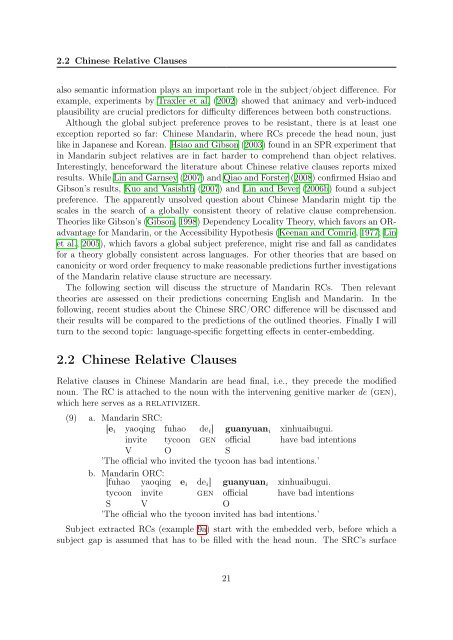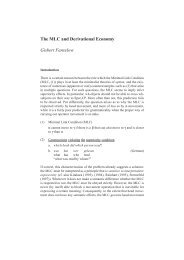Connectionist Modeling of Experience-based Effects in Sentence ...
Connectionist Modeling of Experience-based Effects in Sentence ...
Connectionist Modeling of Experience-based Effects in Sentence ...
You also want an ePaper? Increase the reach of your titles
YUMPU automatically turns print PDFs into web optimized ePapers that Google loves.
2.2 Ch<strong>in</strong>ese Relative Clauses<br />
also semantic <strong>in</strong>formation plays an important role <strong>in</strong> the subject/object difference. For<br />
example, experiments by Traxler et al. (2002) showed that animacy and verb-<strong>in</strong>duced<br />
plausibility are crucial predictors for difficulty differences between both constructions.<br />
Although the global subject preference proves to be resistant, there is at least one<br />
exception reported so far: Ch<strong>in</strong>ese Mandar<strong>in</strong>, where RCs precede the head noun, just<br />
like <strong>in</strong> Japanese and Korean. Hsiao and Gibson (2003) found <strong>in</strong> an SPR experiment that<br />
<strong>in</strong> Mandar<strong>in</strong> subject relatives are <strong>in</strong> fact harder to comprehend than object relatives.<br />
Interest<strong>in</strong>gly, henceforward the literature about Ch<strong>in</strong>ese relative clauses reports mixed<br />
results. While L<strong>in</strong> and Garnsey (2007) and Qiao and Forster (2008) confirmed Hsiao and<br />
Gibson’s results, Kuo and Vasishth (2007) and L<strong>in</strong> and Bever (2006b) found a subject<br />
preference. The apparently unsolved question about Ch<strong>in</strong>ese Mandar<strong>in</strong> might tip the<br />
scales <strong>in</strong> the search <strong>of</strong> a globally consistent theory <strong>of</strong> relative clause comprehension.<br />
Theories like Gibson’s (Gibson, 1998) Dependency Locality Theory, which favors an ORadvantage<br />
for Mandar<strong>in</strong>, or the Accessibility Hypothesis (Keenan and Comrie, 1977; L<strong>in</strong><br />
et al., 2005), which favors a global subject preference, might rise and fall as candidates<br />
for a theory globally consistent across languages. For other theories that are <strong>based</strong> on<br />
canonicity or word order frequency to make reasonable predictions further <strong>in</strong>vestigations<br />
<strong>of</strong> the Mandar<strong>in</strong> relative clause structure are necessary.<br />
The follow<strong>in</strong>g section will discuss the structure <strong>of</strong> Mandar<strong>in</strong> RCs. Then relevant<br />
theories are assessed on their predictions concern<strong>in</strong>g English and Mandar<strong>in</strong>. In the<br />
follow<strong>in</strong>g, recent studies about the Ch<strong>in</strong>ese SRC/ORC difference will be discussed and<br />
their results will be compared to the predictions <strong>of</strong> the outl<strong>in</strong>ed theories. F<strong>in</strong>ally I will<br />
turn to the second topic: language-specific forgett<strong>in</strong>g effects <strong>in</strong> center-embedd<strong>in</strong>g.<br />
2.2 Ch<strong>in</strong>ese Relative Clauses<br />
Relative clauses <strong>in</strong> Ch<strong>in</strong>ese Mandar<strong>in</strong> are head f<strong>in</strong>al, i.e., they precede the modified<br />
noun. The RC is attached to the noun with the <strong>in</strong>terven<strong>in</strong>g genitive marker de (gen),<br />
which here serves as a relativizer.<br />
(9) a. Mandar<strong>in</strong> SRC:<br />
[ei yaoq<strong>in</strong>g fuhao dei] guanyuani x<strong>in</strong>huaibugui.<br />
<strong>in</strong>vite tycoon gen <strong>of</strong>ficial have bad <strong>in</strong>tentions<br />
V O S<br />
’The <strong>of</strong>ficial who <strong>in</strong>vited the tycoon has bad <strong>in</strong>tentions.’<br />
b. Mandar<strong>in</strong> ORC:<br />
[fuhao yaoq<strong>in</strong>g ei dei] guanyuani x<strong>in</strong>huaibugui.<br />
tycoon <strong>in</strong>vite gen <strong>of</strong>ficial have bad <strong>in</strong>tentions<br />
S V O<br />
’The <strong>of</strong>ficial who the tycoon <strong>in</strong>vited has bad <strong>in</strong>tentions.’<br />
Subject extracted RCs (example 9a) start with the embedded verb, before which a<br />
subject gap is assumed that has to be filled with the head noun. The SRC’s surface<br />
21
















